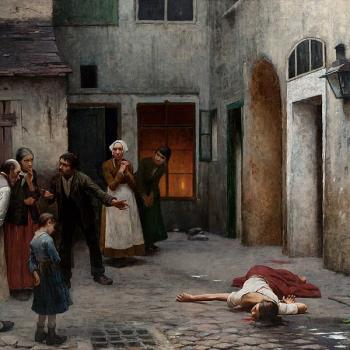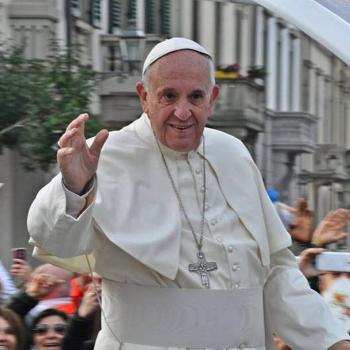The most interesting thing about Pope Francis’ interview with America magazine is not the interview itself (although that is fascinating reading); it’s the fact that everyone in the press is talking/writing about it.
If you ever believed any of those claims that the Church is irrelevant, I offer you the CBS/NBC/ABC/NEWYORKTIMES/HUFFINGTONPOST/ETC/ETC/ETC reaction to every little word that comes out of Pope Francis’ mouth.
Make no mistake about it folks, the Catholic Church matters. Why?
Because, whether they will admit it or not, even those
who deny its power,
who try to re-write history to obliterate its influence,
who talk about how it is “dying” (in the face of all objective evidence to the contrary)
who flat-out hate the Church
— even those people —
know that the Catholic Church is the one great unified moral voice in the world today.
The Catholic Church is not dying. It is growing. The Catholic Church is not irrelevant.
In fact, it is so relevant that even its most dedicated opponents talk about it all the time.
Who else on this planet can give an interview and have it quoted and misquoted to “prove” this or that point in every major news venue? Who else’s interview would rise to the level that major news outlets will pull quotes out of context to “prove” that their position is supported, as if that proof constituted an essential moral underpinning for their viewpoint?
Who else, but the Pope?
The answer is no one.
There’s a reason newscasters wrote as if the Holy Father gave an interview about abortion and homosexuality, when he only mentioned these things in a few sentences. They — not the Pope — are obsessed with these things. They want his blessing for what they do. They want — they crave — the absolution of the Holy Father for their sins.
More to the point, they want a moral fiat telling them that their sins are not sins.
The problem with that is that no matter how much they take things out of context to try to make it seem so, that won’t happen. Pope Francis, when he was speaking in this interview about confessors, said that there are two ways a confessor can be wrong.
One is to be so harsh that the only thing the penitent gets from the confessor is a cold encounter with the commandments. I suppose that this would be similar to what St Paul was talking about when he referenced, “the law.” The other is to be so namby-pamby that the confessor tells the penitent that their sins are not sins. I think this latter way is what the many people who are making rash mis-interpretations of what the Pope said are after.
But the important thing for us to understand is that the Holy Father said quite clearly that both these approaches are wrong. The confessor, and through him the Church, is to show the mercy of Christ without lying to people and telling them that their sins are not sins.
We have a Pope who wants to remind people that the love of Christ is greater than their sins. He is a pastoral pope who has walked with the people enough to know how miserable and lost they are.
I don’t recall if I’ve written about it here, but I’ve often seen that much of the anger that people direct at the Church is not so much anger at God as it is their rage at feeling rejected by God. There are a lot of people who feel unloved by God, who think that God hates them.
How did they get this idea? They got it from Christians who told them that God hates them.
We tend to focus today on homosexuals in this regard. But I think that is a huge mistake. I represent thousands of people who love God but feel separated from the institutional Church because they don’t see a place for themselves inside it. I deal every day with people who are hungry for God, but feel alienated from Him because they are ignored by Christians.
I am not talking here about the politically active drivers of public opinion in various movements. I don’t mean the gay rights activists or the pro abortion people. I mean ordinary people who are impoverished and living on the margins of society and barely hanging on with their fingernails to life itself. These, and not homosexual activists and abortionists, are the forgotten ones.
I believe these are the people Pope Francis is wanting to reach.
In this interview, Pope Francis compared the Church to a hospital. In some ways, what he was describing sounded like an emergency room. When someone is drowning in their sins, when they are in despair and misery, it is a cruelty to hit them with a laundry list of their various wrong-doings and then top that off with condemnation.
I know. I was once Ms Pro Abortion for Oklahoma. I was denounced and attacked and reviled by Christians.
None of this — none of it — moved me to change. Not one name I was called, not one lie that was told about me, not one ugly thing that was done to me in the name of Christ by misguided Christians made me want to change my ways. In fact, it hardened me in them.
It took a direct, personal, encounter with God Himself to get through to me. And then I was so overwhelmed by the love He poured down on me that even today I have no words for it. The interesting thing is that God did not address abortion with me until almost a year and a half after I had turned to Him. He showed me my sins, but at first, it was the little stuff. Even when the Holy Spirit finally began to teach me about my sins with abortion, it was gentle.
This was not because God favored abortion. It was because He loved me.
Protestants sing an old hymn called “Just as I am.” The title says the message of that hymn.
I think that this is the message that Pope Francis is trying to give to lost and hurting people all over the world: God loves you, just as you are. You don’t have to get righteous to come to God. All you have to do is trust Him and let Him love you from death into life.
If that message is not true, then I am not a Christian. Because it is how God dealt with me. The person I am today is the grace and the miracle of that divine love.
http://youtu.be/ovYPQl93zroRead the interview for yourself here.











